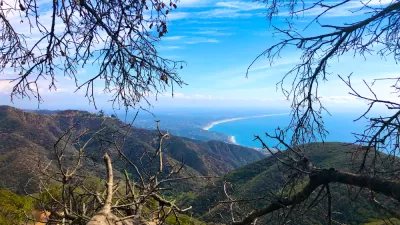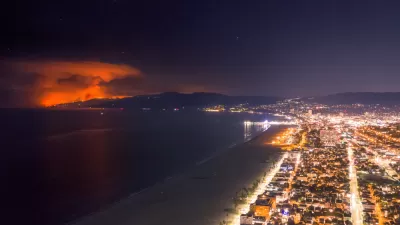Los Angeles County Supervisor Zev Yaroslavsky discusses how the approval of new plans will preserve a stretch of unincorporated Southern California coastline.
Over four decades of work yielded results in April for government officials who had spent their careers seeking to protect a five-mile portion of the Santa Monica Mountains that runs along the coast in Los Angeles County. When the California Coastal Commission approved the Land Use Plan, setting the stage to certify the Local Coastal Program that will govern the area, it reflected a consensus among property owners, environmentalists, agricultural interests, and equestrian representatives that had taken many years to build. LA County Supervisor Zev Yaroslavsky spoke with The Planning Report about the efforts to draft a document that could satisfied these stakeholders, the impact of the plan's approval, and steps still necessary to ensure that the mountains flourish in the future.
Yaroslavsky, who was elected to Los Angeles City Council in 1975 and has been a county supervisor for 20 years, describes how the plan he helped design will prevent subdivisions and other potentially harmful development from encroaching on an ecosystem that is beginning to see the return of wildlife, in close proximity to the metropolitan area's 15 million people. Beyond that, he articulates the challenges still facing the area that will fall to the next generation of political leaders to resolve.
In Zev's words, "We are protecting the ridgelines from being sawed off. We’re protecting the oak groves and the sycamore groves from being destroyed. We’re protecting the rivers and rivulets from being polluted. We’re also protecting the Santa Monica Bay from being polluted by upstream pollutants. Basically, we’re protecting it from ourselves. My philosophy has always been to let the terrain dictate the development, not the other way around. People who own private property have a right to use it, but they don’t have a right to destroy the very thing that attracted them in the first place."
FULL STORY: Coastal Land Use Plan Approval—A Victory for Santa Monica Mountains and Zev Yaroslavsky

Maui's Vacation Rental Debate Turns Ugly
Verbal attacks, misinformation campaigns and fistfights plague a high-stakes debate to convert thousands of vacation rentals into long-term housing.

Planetizen Federal Action Tracker
A weekly monitor of how Trump’s orders and actions are impacting planners and planning in America.

In Urban Planning, AI Prompting Could be the New Design Thinking
Creativity has long been key to great urban design. What if we see AI as our new creative partner?

San Francisco Mayor Backtracks on Homelessness Goal
Mayor Dan Lurie ran on a promise to build 1,500 additional shelter beds in the city, complete with supportive services. Now, his office says they are “shifting strategy” to focus on prevention and mental health treatment.

How Trump's HUD Budget Proposal Would Harm Homelessness Response
Experts say the change to the HUD budget would make it more difficult to identify people who are homeless and connect them with services, and to prevent homelessness.

The Vast Potential of the Right-of-Way
One writer argues that the space between two building faces is the most important element of the built environment.
Urban Design for Planners 1: Software Tools
This six-course series explores essential urban design concepts using open source software and equips planners with the tools they need to participate fully in the urban design process.
Planning for Universal Design
Learn the tools for implementing Universal Design in planning regulations.
Gallatin County Department of Planning & Community Development
Heyer Gruel & Associates PA
JM Goldson LLC
Mpact (founded as Rail~Volution)
City of Camden Redevelopment Agency
City of Astoria
Jefferson Parish Government
Camden Redevelopment Agency
City of Claremont




























